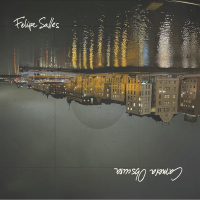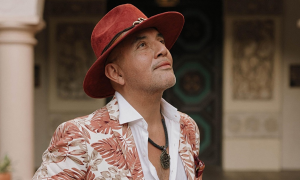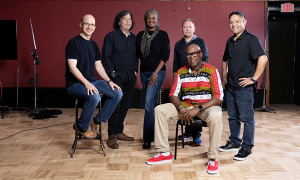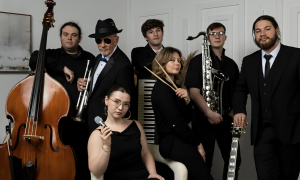Home » Jazz Articles » Take Five With... » Take Five with vocalist Diana Hamilton
Take Five with vocalist Diana Hamilton
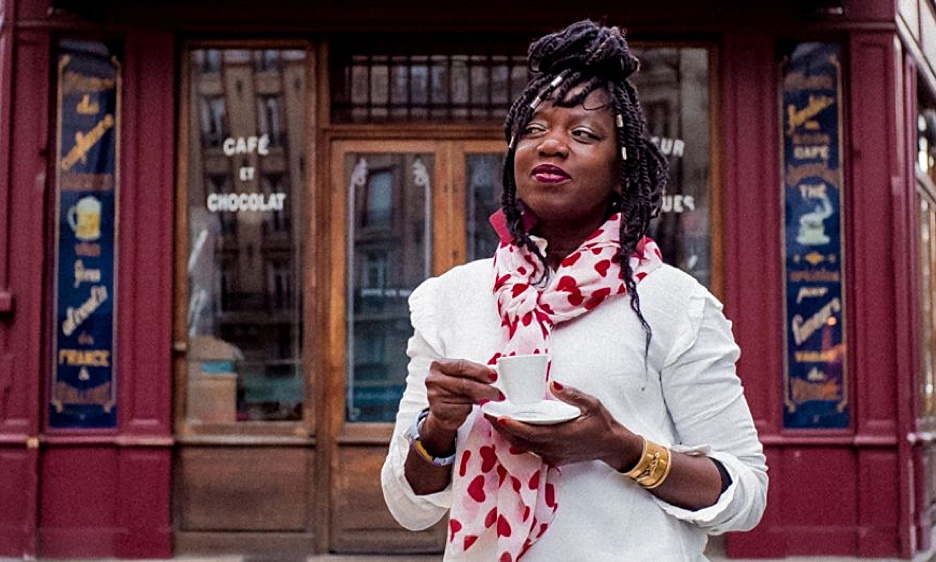
Meet vocalist Diana Hamilton
I'm an instinctive artist—meaning, I didn't choose to be a singer. Singing chose me. It began during a moment of deep torment when my three-year-old son, Nairobi, was subjected to racism at a daycare in France. I had never experienced such cruelty growing up as a Black child in the Bahamas. I wasn't prepared for the brutality of what I witnessed—not in a country where I had chosen to raise my child.One day, after finding my son's face torn and bleeding from an attack by another child—while the adults on duty stood by—I took him to a quiet square to let him kick a ball. As I sat there in despair, something shifted. I felt a vibration in my ear, then heard a melody. Words poured out of me, and I began to sing. I didn't even realize I was channeling a song. That song was "Nairobi." A friend overheard me and said, "That's a song. Come record it." That was the beginning. I had been cracked open, and music came pouring in to guide my troubled mind.
The voice that emerged from me that day didn't sound like anyone I knew. I had no reference for it. One journalist called it "inclassable"—unclassifiable. It would take me years of tears, setbacks, and quiet courage to finally claim that voice as mine.
The French composer Florian Lacour became a major influence during my early years, encouraging me to sing country music and later offering me two of his own compositions: "Tant d'AnnЁҰes" (a long-running hit on FIP and Radio Nova) and "Dans Les Petits CafЁҰs" (with over 30,000 listens on Spotify).
I am inspired by the spirit of artists who poured themselves fully into their work—Elvis Presley,

Nina Simone
piano and vocals1933 - 2003

Bob Marley
guitar1945 - 1981

Fela Kuti
saxophone1938 - 1997

Don Cherry
trumpet1936 - 1995

Josephine Baker
vocals1906 - 1975

Billie Holiday
vocals1915 - 1959

Howlin' Wolf
vocals1910 - 1976
Two decades later, I'm reissuing A Bahamian in Paris (2005) in a special Independence Edition, with unreleased tracks and original mixes. I've since released Babylon CafЁҰ (Self Produced, 2019) and the single Traveling On (2024), and just completed a trilogy of new songs for The Bahamas—music rooted in justice, memory and national healing.
My voice continues to lead me, and I follow.
Instruments:
I play the carpenter saw with a screwdriver as handed down by my African ancestors. It is usually accompanied by the accordion and the goatskin drum, but I use it to accompany certain songs or when I sing acapella.Teachers and/or influences?
One of the most important influences in my artistic journey has been Florian Lacour, a celebrated French composer known for reviving the spirit of medieval chivalry through music. He composed extensively for the internationally renowned neo-medieval group Les Derniers TrouvЁЁres, and he brought that same visionary depth into our collaborations. Florian co-wrote the lyrics with me for "Le Bonheur" (from A Bahamian in Paris) and composed two deeply personal songs for me: "Tant D'AnnЁҰes" (also from A Bahamian in Paris) and "Dans Les Petits CafЁҰs" (from Babylon CafЁҰ). His music creates what I call "sonic icons"—places and characters that stir not only historical memory but also emotional and philosophical reflection.His songs carry both a rappel—a recall of what is noble and meaningful in our collective past—and an appel—a call to awaken the best within ourselves, to believe in the possibility of a more idyllic, conscious way of living.
Collaborating with Florian Lacour opened a new dimension in my understanding of song as sacred storytelling. His work reminded me that music can connect us across time, stirring both our roots and our highest aspirations.
I knew I wanted to be a musician when...
I didn't. I never dreamt of being a musician. I wanted to be a teacher—and I became one. Music, however, chose me. It came uninvited, during a time of deep pain, and it stayed. For years, I resisted the path, unsure of how to carry such a gift. It didn't match the life I had planned. But eventually, I stopped rebelling. I accepted what had been placed in my hands—and in my voice—with gratitude.Now I understand: music is not just what I do. It's how I serve.
Your sound and approach to music.
I love to swing. My sound is often best described by those who listen. I only sing what I love—what carries a message, not just sentiment. I don't sing sad songs for the sake of sadness. I sing to awaken, to nourish, to carry truth.When A Bahamian in Paris was released in France in 2005, EMI invited me to their offices and offered me a contract—if I would agree to sing a

Dinah Washington
vocals1924 - 1963
Composer Florian Lacour said it best:
"She 'loves to live in France,' where she mingles inside les petits cafЁҰs... and she sings all this with such kindness, humour, and mischievousness. This Bahamian from Paris interprets standards in her very own style—jazzy, calypso, reggae—backed by a swinging band that makes us groove while making us aware of the history of her people."
WOMAD described A Bahamian in Paris as:
"Charming genre-crossing from the Bahamian chanteuse... Her voice, equally charming in English or French, sounds not unlike a Bahamian cross between

Ella Fitzgerald
vocals1917 - 1996
Your teaching approach
I teach with deep respect—for who my students are, and for who they are striving to become. I pay close attention to the blockages—emotional, cultural, or psychological—that can slow down the learning process. But most of all, I encourage them to open the wings of their perception, to dare, and to rediscover the joy of learning.The accordion camp I've organized each summer since 2013 carries this dual purpose. First, it's about reconnection—inviting young people to tap into their ancestral line, to recognize that the music their ancestors created was not merely for entertainment, but for survival, dignity, and resistance under the brutal legacy of slavery.
Secondly, it's about creation—about discovering the inner sanctuary where they can become creators because they've learned how to listen deeply, even to the whisper of God. Teaching, for me, is sacred. It's where memory, freedom, and imagination begin to dance.
Your dream band
This is a maturing idea—one that's still evolving with me. But I do have some elements I feel drawn to deeply. I discovered Kujato's new video on ABJ and love his jazz beats. I do wish I could collaborate with him on a song I am working on called "Why Black Girls get the Blues." I'd love to work with a soulful accordionist, of course—it's an instrument close to my heart and heritage. I imagine a female drummer with the same tight, dynamic energy as the one in Kitty, Daisy & Lewis—there's something powerful and grounding in the way she plays. I'd add a percussionist like Mario, who knows how to shape rhythm like ritual, and a backup singer like Melanie, whose harmonies lift and soften at just the right moments. The bass guitar would need to carry weight and warmth—something like Hugh Betcha's playing, full of pulse and purpose.My dream band wouldn't just support the music—they'd feel it, live it, and bring its message into the room with reverence and joy.
Road story: Your best or worst experience
I was performing "Fever" on stage at the exclusive Paris jazz club, Le Petit Journal Montparnasse, when—mid-song—my wig fell right off my head. Without missing a beat, I picked it up, plopped it back on, and kept singing. Someone from the audience told me afterwards that I sang the second half with even more feeling! What I love most are those unpredictable moments when something goes hilariously wrong, the audience roars with laughter, and somehow, the show becomes even better.Favorite venue
I love festivals. One of my favorites is the 100% Country Music Festival in Craponne-sur-Arzon, France, held every year on the last weekend of July. The whole town transforms—everyone dresses in country gear, and music fills the streets with both the main concerts at Star Park and the lively Off festival. It was during one of those unforgettable weekends that I met Eric Henri-GrЁҰard, who later became my bandleader and co-composer on A Bahamian in Paris. That festival wasn't just fun—it changed the course of my musical journey..Your favorite recording in your discography and why?
I have many favorites... "Nairobi" was the first song I ever channeled—a gift that arrived to help me walk my path without fear. It was born from the challenge of raising my son in a racist, hostile society, and became my promise to hold his hand until he could stand—not just physically, but emotionally, and with the wings of his inner intuition firmly rooted in his being. It was the first of many gifts—songs that lift me when I fall, and help me soar when I feel the pull of my creative self.What do you think is the most important thing you are contributing musically?
I believe my greatest contribution is to remind my people—and all people—that music is meant to feed the mind, console the soul, and encourage the spirit. It's more than entertainment; it's a lifeline, a guide, a healing force. That's the intention I carry into every note I sing.Did you know...
I'm actually terribly shy—even though I often come across as an extrovert on stage or in public. Performing helps me step out of myself, but behind the scenes, I'm much more reserved than people expect.The first jazz album I bought was:
Chapter Two by Roberta Flack. Her voice, her phrasing, the soulfulness of each song moved me deeply. I would sing her songs over and over again, alone, long before the period in my life when I would be opened to receive "Nairobi." That album planted a seed—it taught me how to feel every word and deliver it with quiet power.Desert Island picks:
Elvis Presley: Amazing Grace (RCA, 1994) Nina Simone: Here Comes the Sun (RCA Victor, 1971) Bob Marley & The Wailers: Uprising (Island Records, 1980) Ella Fitzgerald & Louis Armstrong: Ella and Louis (Verve Records, 1956) Various Artists: Woodstock: Music from the Original Soundtrack and More (Cotillion Records, 1970)How would you describe the state of jazz today?
I think the original jazz artists deserve a bigger place in the spotlight. Too often, people become famous by imitating the voice and style of another, rather than bringing something truly their own. That's not what jazz is about. Amy Winehouse, for example, was an interesting artist because she had a voice of her own—even while working within a traditional sound.What jazz needs today is more distinct voices, not replicas. The public is already there, hungry and ready to receive. Fela Kuti showed how powerful jazz can be when it fuses with other traditions—he created something electric by blending jazz with African rhythms to create a new genre called afrobeat. That spirit of innovation is what keeps jazz alive.
What are some of the essential requirements to keep jazz alive and growing?
We need to make room for new artists to emerge—artists who follow in the spirit of the original creators: daring, funny, impeccable, warm and tender. Jazz has always been about invention and soul. To keep it alive, we must stop trying to format raw talent to fit a mold. Instead, we should nurture individuality and allow new voices to shape the future of the music.What is in the near future?
To celebrate the 20th anniversary of A Bahamian in Paris, a special limited-edition reissue of the album is on the way. It will feature songs from the original mix alongside previously unreleased tracks. Also coming this August is a new trilogy of songs dedicated to The Bahamas—offering a powerful musical reflection on identity, justice and healing.What is your greatest fear when you perform?
I used to be beset by all kinds of fears and inner torments before going on stage, but stepping away from music for a decade allowed both my voice and my inner knowing to mature. Now, once I choose the song—or songs—I want to sing, I get to work rehearsing. When I step on stage, I let the artist in me take over. There is no fear in that moment—only a quiet surrender as I shift from ordinary awareness to artistic instinct, guided by something deeper.What song would you like played at your funeral?
"Amazing Grace" or "Gideon's Balm." Both speak of grace, healing, and divine strength—messages I would want to leave behind.By Day:
Most of my energy now goes into keeping the accordion alive by organizing a free summer camp and doing field research on who played the accordion in The Bahamas, with the goal of creating an online digital library. The rest of my time is devoted to my music and rebuilding my career. I also take on translation and interpretation work when opportunities arise. Soon, I hope to launch a Pop French class for children in a disadvantaged neighborhood—to get their brains popping, just as they should.If I weren't a jazz musician, I would be a:
Jazz musician. There's really no alternative—this is who I am.If I could have dinner with anyone from history, who would it be and why?
Joan of Arc. I admire her courage, her unwavering determination, and the simple, profound faith that carried her through unimaginable trials. She stayed true to her divine purpose to the very end—and that kind of conviction continues to inspire me.If I could go back in time and relive an experience, what would it be?
I would go back and not make the fatal mistake of marrying my producer. That decision changed the course of my life and career—but it also taught me that I am the music I create, and no one can take that away from me.What's the song or piece of music you wish you could hear again for the first time?
I am called Diana, like the Goddess. And the first time I heard "Diana" by Florian Lacour, I felt the music speak to something beyond me. I would love to hear it again for the first time—but with the insight I have now, to understand why it was given to me to sing. At first, I hesitated, thinking it was too far from what I usually performed. Now I know it was a mirror, a message, and a calling.I am going to record it—without worrying about how it will be perceived or received.
Fela Kuti once said, "Music is the weapon of the future." Have we reached that moment in time?
We are closer than we've ever been. In a world overwhelmed by noise and division, music remains one of the few forces that can cut through and unite. But it must be created with truth, not ego; with purpose, not vanity.As an artist, I've come to understand that music isn't just something I do—it's something I carry. It restores memory, protects the vulnerable, and calls people back to their source. When we use music to awaken, to heal, and to reveal what's been hidden—then yes, we begin to live in the future Fela envisioned.
Tags
Take Five With...
Diana Hamilton
AAJ Staff
Nina Simone
bob marley
Fela Kuti
Don Cherry
Josephine Baker
Billie Holiday
Howlin' Wolf
Dinah Washington
Ella Fitzgerald
Comments
PREVIOUS / NEXT
Support All About Jazz
 All About Jazz has been a pillar of jazz since 1995, championing it as an art form and, more importantly, supporting the musicians who make it. Our enduring commitment has made "AAJ" one of the most culturally important websites of its kind, read by hundreds of thousands of fans, musicians and industry figures every month.
All About Jazz has been a pillar of jazz since 1995, championing it as an art form and, more importantly, supporting the musicians who make it. Our enduring commitment has made "AAJ" one of the most culturally important websites of its kind, read by hundreds of thousands of fans, musicians and industry figures every month.


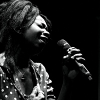
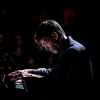




 Buy Now
Buy Now



